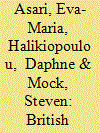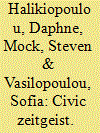| Srl | Item |
| 1 |
ID:
081348


|
|
|
|
|
| Publication |
2008.
|
| Summary/Abstract |
Nationalism and multiculturalism are often perceived as polar opposites with the former viewed as the disease and the latter the cure. Contrary to this view, this article argues that a strong national identity, albeit of a particular kind, is prerequisite to a stable and functioning multicultural society. The article seeks to identify both the causes and the implications of the absence of an overarching, civic national identity in Britain, further to the goal of seeking a meaningful solution. It is our contention that the problem lies in the difficulty involved in reconciling current pressures on British identity with a coherent narrative of British history, especially its imperial past
|
|
|
|
|
|
|
|
|
|
|
|
|
|
|
|
| 2 |
ID:
120360


|
|
|
|
|
| Publication |
2013.
|
| Summary/Abstract |
This article examines the relationship between nationalism and liberal values and, more specifically, the redefinition of boundaries between national communities and others in the rhetoric of radical right parties in Europe. The aim is to examine the tension between radical right party discourse and the increasing need to shape this discourse in liberal terms. We argue that the radical right parties that successfully operate within the democratic system tend to be those best able to tailor their discourse to the liberal and civic characteristics of national identity so as to present themselves and their ideologies as the true authentic defenders of the nation's unique reputation for democracy, diversity and tolerance. Comparing the success of a number of European radical right parties ranging from the most electorally successful Swiss People's Party, the Dutch Pim Fortuyn List and Party for Freedom to the more mixed French Front National, British National Party and National Democratic Party of Germany we show that the parties that effectively deploy the symbolic resources of national identity through a predominantly voluntaristic prism tend to be the ones that fare better within their respective political systems. In doing so, we challenge the conventional view in the study of nationalism that expects civic values to shield countries from radicalism and extremism.
|
|
|
|
|
|
|
|
|
|
|
|
|
|
|
|